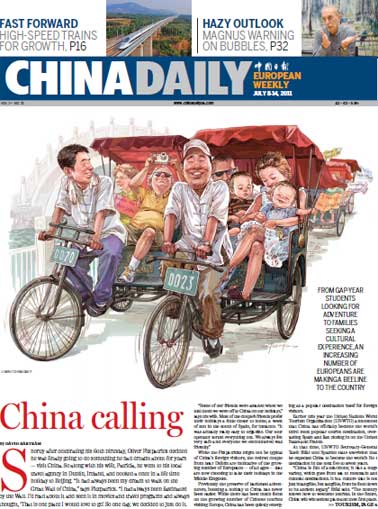Society
Maritime disputes 'will not affect ties'
Updated: 2011-07-09 07:46
By Cheng Guangjin and Wu Jiao (China Daily)
|
![Foreign Minister Yang Jiechi (right) meets visiting Philippine Foreign Secretary Albert del Rosario at Diaoyutai State Guesthouse in Beijing on Friday. [Wu Zhiyi / China Daily] Maritime disputes 'will not affect ties'](../../images/attachement/jpg/site1/20110709/0013729e48090f81dba312.jpg) Foreign Minister Yang Jiechi (right) meets visiting Philippine Foreign Secretary Albert del Rosario at Diaoyutai State Guesthouse in Beijing on Friday. [Wu Zhiyi / China Daily] |
Philippine minister meets with FM; paves way for visit by Aquino
BEIJING - China and the Philippines on Friday agreed not to let maritime disputes affect relations.
Chinese Foreign Minister Yang Jiechi and Philippine Foreign Affairs Secretary Albert del Rosario exchanged views on the recent maritime disputes and agreed not to let disagreements affect "the broader picture of friendship and cooperation between the two countries", read a joint news release issued after the ministers' talks in Beijing.
Del Rosario's three-day trip, which ends on Saturday, has been widely speculated in the media as an effort to calm tensions and slam the brakes on an escalating dispute.
During the talks, Xi reportedly said China adheres to the path of peaceful development and sticks to the policy of building friendship and partnership with neighboring countries.
"China is committed to remaining a good neighbor, a good friend and a good partner to the Philippines," Xi said, according to a press release from the foreign ministry.
Yang also added that China attaches great importance to relations with the Philippines, and hailed the visit as helpful to increasing communication and coordination in international and regional affairs.
"I believe through the efforts of both sides, your visit will help push forward the development of bilateral relations on a sound and steady track," he said, according to the official statement.
Del Rosario, on his first visit to China since taking his post, said developing ties with China is a major diplomatic task of the Philippine government, and he pledged to make joint efforts with China to push forward "healthy development of the mutually beneficial bilateral ties".
A news release from the Chinese foreign ministry said both ministers exchanged opinions on the South China Sea. They stressed the two countries will abide by the code of conduct signed by China and members of the Association of Southeast Asian Nations (ASEAN) and their joint commitment to the regional peace and stability.
Covering an area of more than 3.5 million sq km, the South China Sea is believed to hold vast deposits of oil and natural gas.
China, the Philippines, Brunei, Malaysia and Vietnam all lay claim to some islands and reefs in the area, with some countries having begun development of the maritime resources in disputed regions.
To solve disputes, in 2002 China and ASEAN signed the Declaration on the Conduct of Parties in the South China Sea, in which they pledged to jointly safeguard regional stability, cooperate in the area and resolve disputes through peaceful talks between the direct claimants.
However, tension has lingered, as some countries continue their maritime development in disputed areas.
Yang Baoyun, deputy director of Peking University's center for Southeast Asian studies, said Albert del Rosario's visit "at least helps the two sides know about each others' thoughts on sensitive issues" and "alleviate contradictions".
"China and the Philippines have kept good relations, and the South China Sea dispute, which has been intense these days, doesn't represent the whole relationship," he told China Daily.
Beijing and Manila have signed more than 100 agreements over the past 36 years of diplomatic relations, and China is the third biggest trading partner of the Philippines, with two-way investments and contracted projects growing fast.
The visit by Manila's top diplomat is also regarded as paving the way for Philippine President Benigno Aquino's visit to China, which is likely to take place in late August or early September.
Yang of Peking University said it takes time to solve problems when national interests are involved. "We need patience and peaceful negotiation while sticking to certain principles," he said, noting China has exercised restraint against provocation by some countries.
However, other experts have warned of powers outside the South China Sea region playing an important role in fueling the dispute, as some hold that the sea dispute is a starting point for the United States' back-to-Asia policy.
Xinhua contributed to this story.
E-paper

Burning desire
Tradition overrides public safety as fireworks make an explosive comeback
Melody of life
Demystifying Tibet
Bubble worries
Specials

90th anniversary of the CPC
The Party has been leading the country and people to prosperity.

Say hello to hi panda
An unusual panda is the rising star in Europe's fashion circles

My China story
Foreign readers are invited to share your China stories.




